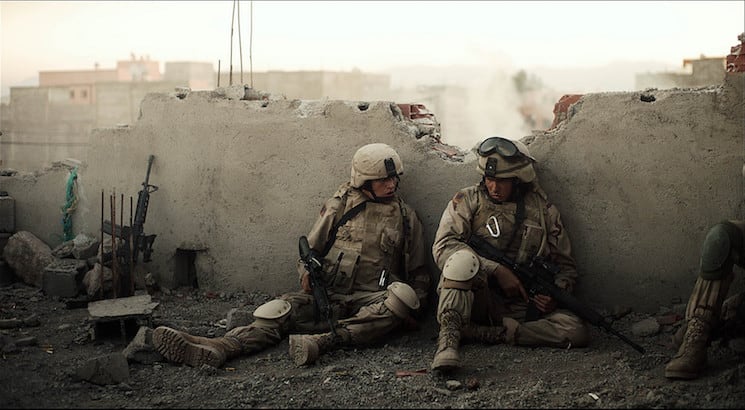Post-traumatic stress disorder is one of the most palpable psychological consequences of war, and it's a subject that's loosely explored in Alexandre Moors' latest film, The Yellow Birds. An adaptation of Kevin Powers' novel of the same name, the film looks at the aftermath of a mid-2000s deployment in Iraq.
Before he plays young Han Solo, Alden Ehrenreich lends a quiet rage to his role as Private Bartle. His loose cannon Sergeant Sterling (Jack Huston) has asked him to look after Murph, a fresh-faced young recruit (played with gentle innocence by Tye Sheridan). For the first act of the film, we watch the boys bond as they train and fight together overseas.
The film's second act jumps ahead to the soldiers' homecoming, where we learn that Murph has gone missing. His mother (a serviceable Jennifer Aniston) is pressing the army to reveal the details of her son's whereabouts. Bartle's unhappy mother (a slightly over the top Toni Colette), meanwhile, attempts to reconnect with her son while he drinks away his inner turmoil, one six-pack at a time. He and Sterling are clearly hiding something about Murph's disappearance.
It's a compelling turn of events, and for a moment, The Yellow Birds begins to feel like a mysterious thriller. Where did Murph go, and why are these men hell-bent on hiding the truth? That, compounded with the film's gritty look, make The Yellow Birds feel like a new war classic halfway through.
Unfortunately, Moors doesn't make the most of his opportunities. The long, drawn-out reveal of what happened to Murph is certainly grisly and grave, but it's hardly mysterious enough to warrant the long wait. Further, despite solid acting efforts from everyone involved, the film falls prey to some cheeseball directing moves. Its conclusion is all too neat, revisiting its opening scene with the addition of an on-the-nose Radiohead song. Yes, the exit music for this film is "Exit Music (For a Film)."
There are numerous worthwhile film interpretations of the horrors of war, so The Yellow Birds is hardly essential. Still, if you enjoy watching solid actors string you along in a mystery, it's at least worth a watch.
(Warner Bros.)Before he plays young Han Solo, Alden Ehrenreich lends a quiet rage to his role as Private Bartle. His loose cannon Sergeant Sterling (Jack Huston) has asked him to look after Murph, a fresh-faced young recruit (played with gentle innocence by Tye Sheridan). For the first act of the film, we watch the boys bond as they train and fight together overseas.
The film's second act jumps ahead to the soldiers' homecoming, where we learn that Murph has gone missing. His mother (a serviceable Jennifer Aniston) is pressing the army to reveal the details of her son's whereabouts. Bartle's unhappy mother (a slightly over the top Toni Colette), meanwhile, attempts to reconnect with her son while he drinks away his inner turmoil, one six-pack at a time. He and Sterling are clearly hiding something about Murph's disappearance.
It's a compelling turn of events, and for a moment, The Yellow Birds begins to feel like a mysterious thriller. Where did Murph go, and why are these men hell-bent on hiding the truth? That, compounded with the film's gritty look, make The Yellow Birds feel like a new war classic halfway through.
Unfortunately, Moors doesn't make the most of his opportunities. The long, drawn-out reveal of what happened to Murph is certainly grisly and grave, but it's hardly mysterious enough to warrant the long wait. Further, despite solid acting efforts from everyone involved, the film falls prey to some cheeseball directing moves. Its conclusion is all too neat, revisiting its opening scene with the addition of an on-the-nose Radiohead song. Yes, the exit music for this film is "Exit Music (For a Film)."
There are numerous worthwhile film interpretations of the horrors of war, so The Yellow Birds is hardly essential. Still, if you enjoy watching solid actors string you along in a mystery, it's at least worth a watch.
